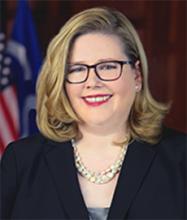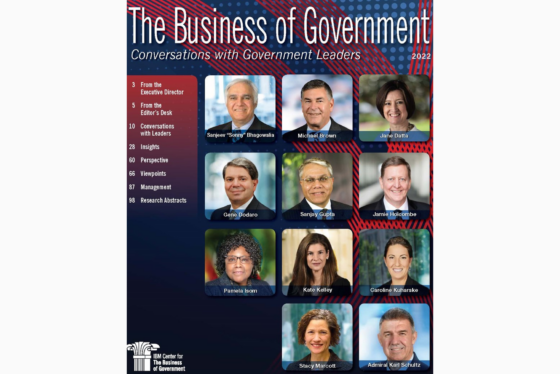Insight By Business Of Government Hour
Government efficiency: a conversation with GSA’s Emily Murphy
What are U.S. General Services Administration's key strategic priorities? How is GSA making government more effective and efficient? What is GSA doing to promote...
This content is provided by the IBM Center for the Business of Government.
Mondays at 11:00 a.m. & Fridays at 1:00 p.m.
The Business of Government Radio Hour, hosted by Michael J. Keegan, features a conversation with a federal executive who is changing the way government does business. The executives discuss their careers and the management challenges facing their organizations. Guests include administrators, chief financial officers, chief information officers, chief operating officers, commissioners, controllers, directors, and undersecretaries.
SPECIAL REBROADCAST:
What are U.S. General Services Administration’s key strategic priorities? How is GSA making government more effective and efficient? What is GSA doing to promote smarter management, buying, and use of technology across the federal government? Join host Michael Keegan as he explores these questions and more with Emily Murphy, Administrator, U.S. General Services Administration.
LISTEN TO THE FULL SHOW:
GUEST BIOGRAPHY:
 Emily W. Murphy was sworn in as administrator of the U.S. General Services Administration (GSA) by U.S. Office of Management and Budget Director Mick Mulvaney on December 12, 2017. President Donald J. Trump nominated Ms. Murphy to lead GSA in September 2017. She was unanimously confirmed by the U.S. Senate on December 5, 2017.
Emily W. Murphy was sworn in as administrator of the U.S. General Services Administration (GSA) by U.S. Office of Management and Budget Director Mick Mulvaney on December 12, 2017. President Donald J. Trump nominated Ms. Murphy to lead GSA in September 2017. She was unanimously confirmed by the U.S. Senate on December 5, 2017.
Administrator Murphy leads a staff of 11,600 employees nationwide, overseeing more than 371 million square feet of property, and approximately $54 billion in annual contracts.
Prior to being confirmed as administrator, Ms. Murphy served as senior advisor to GSA’s acting administrator. In that role, she helped guide the merger of the Federal Acquisition Service (FAS) and the Technology Transformation Service (TTS) and advised on opportunities to improve how GSA facilitates technology purchases.
Administrator Murphy previously served at GSA from 2005-2007, where she was appointed the inaugural chief acquisition officer and led the transformation of the agency’s assisted acquisition centers and the consolidation of the Federal Supply Service and the Federal Technology Service. Administrator Murphy also served as GSA’s representative to the Federal Acquisition Regulatory (FAR) Council and the leader of the Civilian Agency Acquisition Council, which are responsible for procurement regulations. In this capacity, she modernized the FAR and GSA regulations to reflect the government’s increasing use of service contracts as opposed to commodity buys.
Administrator Murphy’s previous public service includes an appointment at the U.S. Small Business Administration, where her efforts resulted in the agency meeting its statutory 23 percent prime contracting goal for the first time, and nine years in the U.S. House of Representatives on the House Committee on Small Business and House Armed Services Committee. A renowned contracting expert, she helped draft and prepare bipartisan government contracting reform packages that helped more small businesses compete for government contracts by minimizing barriers to entry, reducing regulatory burdens, and eliminating waste, fraud, and abuse in government contracting.
Administrator Murphy’s private sector experience includes five years in executive positions at a technology startup company engaged in federal contracting and three years as a government contracts attorney with two top Washington, D.C. law firms.
Her expertise in government procurement and work in creating opportunities for small businesses has earned her numerous awards from small business and contracting groups.
A native of St. Louis, Missouri, Administrator Murphy is a 1995 graduate of Smith College and a 2001 graduate of the University of Virginia School of Law.
Copyright © 2024 Federal News Network. All rights reserved. This website is not intended for users located within the European Economic Area.





